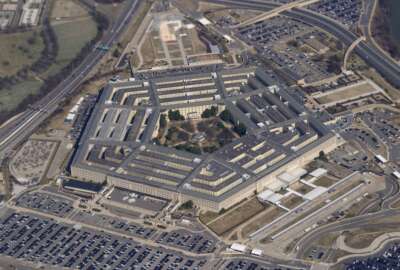DoD’s troubled Sentinel program will continue despite ballooning costs
The Sentinel program designed to replace aged Minuteman III missiles survives despite triggering a law that monitors cost overruns of major defense programs.
The Defense Department has determined that the troubled Air Force program to modernize its aging nuclear missiles will continue despite the program’s soaring costs.
Earlier this year, the Department of the Air Force notified Congress that the Sentinel intercontinental ballistic missile (ICBM) program exceeded baseline cost estimates, breaching the Nunn-McCurdy Act designed to monitor cost overruns of major defense acquisition programs. The breach was triggered by a 37% cost overrun of the overall program.
A breach occurs when the cost of a program grows by 25%, and the program must be terminated unless the office of the under secretary of Defense for Acquisition and Sustainment can prove that the program meets the criteria to continue.
Undersecretary of Defense for Acquisition and Sustainment William LaPlante, who led the program review process, established that the Sentinel program designed to replace aged Minuteman III missiles will continue despite rapidly increasing costs.
“Over the past 120 days, I have led the department in executing our statutory responsibilities to conduct a comprehensive, unbiased review of the program to determine what factors led to this cost growth and whether to certify continuation of the program,” LaPlante told reporters Monday.
“Based on the results of the review, it is clear that a reasonably modified Sentinel program remains essential to U.S. national security and is the best option to meet the needs of our warfighters.”
LaPlante’s team established that the Sentinel program is essential to national security; there are no alternatives to the program that will provide acceptable capability to meet the requirements at less cost; the program is a higher priority than other programs whose funding might be reduced in the future to fund the Sentinel program; the program has sufficient oversight to manage and control further cost increases; and the director of Cost Assessment and Program Evaluation (CAPE) determined that the new cost estimates are reasonable.
“It is important to note that this certification does not indicate business as usual. The program will be restructured to address the root causes of the breach and ensure an appropriate management structure is in place to control costs,” said LaPlante.
The Sentinel program is now expected to cost $140.9 billion, an 81% increase compared to the estimates made at the program’s previous milestone B decision in September 2020. LaPlante said the service’s knowledge of the ground-based infrastructure was “insufficient in hindsight,” which led to significant cost overruns.
LaPlante also rescinded the program’s milestone B, the decision point in the acquisition cycle at which a program gets reviewed and approved for entering the engineering and manufacturing development phase. The under-secretary said he instructed the service to restructure the program. While the schedule will be a key consideration during this restructuring process, the program will most likely be delayed by at least several years.
“The department’s leaders are acutely aware that we can and must do more to improve program management and oversight of this vital project. We do not take lightly the once-in-a-generation responsibility to modernize the ground leg of the nuclear triad and are mindful of the scope and scale of this undertaking, which is unprecedented in contemporary times,” said Andrew Hunter, assistant secretary of the Air Force for acquisition, technology and logistics.
“Over the coming months, we’ll develop a comprehensive plan for how the Air Force will restructure the program tackling the root causes of cost growth. While prioritizing effective program management and oversight, we’ll move quickly to mature the restructure options you’ve directed, especially related to the command and launch segment, improving our systems engineering and adjusting the contract structure and execution to deliver this project.”
Vice Chief of Staff of the Air Force Gen. James Slife said the program cost growth will not occur during the current five-year Future Years Defense Program, so it’s unclear what programs will be affected in order to continue financing Sentinel.
“It is a decision for down the road to decide what trade-offs we’re going to need to make in order to be able to continue to pursue the Sentinel program. But those decisions won’t be made until we get to the new Milestone B decision,” said Slife.
Copyright © 2025 Federal News Network. All rights reserved. This website is not intended for users located within the European Economic Area.







